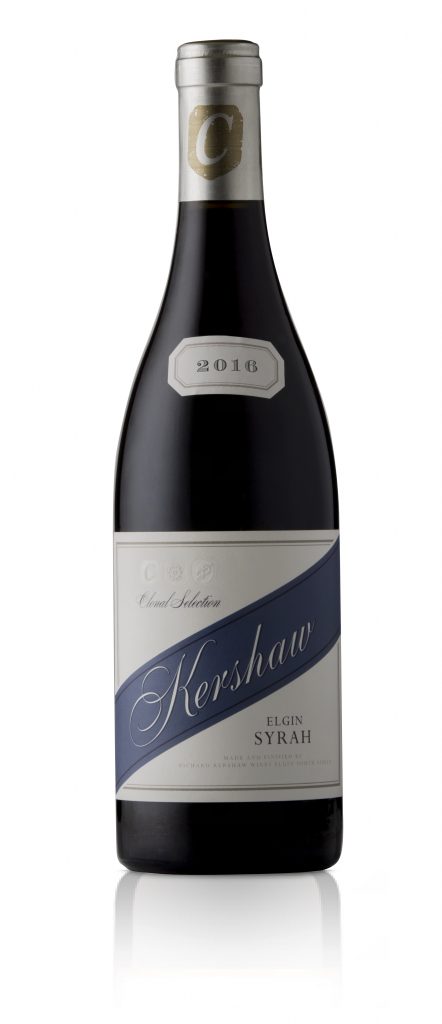2018 Kershaw Elgin Syrah
RANGE: Clonal Selection
VARIETAL INFORMATION: 100% Syrah made up of clones SH9c, SH22 & SH99.
WINE OF ORIGIN: Elgin, Western Cape, South Africa
TOTAL VINEYARD PRODUCTION: 10.4 tons selected from 5 small parcels of Syrah.
HISTORY: In 2012, owner Richard Kershaw MW established Richard Kershaw Wines to
create clonally selected, site-specific, cool climate wine paradigms from apposite noble grapes
i.e. ones with the ability to produce world-class examples. SA’s coolest wine district, Elgin Valley,
reflected these principles benefitting from higher altitude, ocean proximity, specific cloud cover
sequencing, high cold units and a large diurnal range, enabling the germane grapes, Chardonnay
and Syrah and more recently Pinot Noir, to show a sense of place.
VINTAGE: Hand-Picking Dates: 17th – 23rd March 2016
Harvest Brix: 21.8 – 23.5
SEASON: In 2016, the preceding winter was fairly dry but cold units were exceptional (1200)
with plenty of frosty mornings, allowing the vines to go into a proper dormancy. Rain did finally
fall in August and September but as October began, the effect of the El Niño phenomenon (or
ENSO episode) started to take effect. October was unusually warm accelerating budbreak and
flowering. The fluctuating warm and cool days meant flowering was uneven, giving rise to smaller
potential bunch sizes. After a cooler November, December was warm, sunny and dry enabling
potential diseases to be kept at bay. A hot and dry January, meant acidity retention by the vine
was challenging but after a warm start to February, the weather finally became cooler – and
night time temperatures also dipped more so than average – providing the vine with some
respite after a particularly torrid summer. The drier conditions meant that disease pressure
was minimal, and a healthy crop was picked between the middle and end of March.
The thicker skins held plenty of anthocyanins but meant it was crucial to avoid over
extraction. Thus, gentler punch-downs were employed, and post fermentation
maceration was shorter with the press fraction matured separately from the free
run juice. This resulted in deeper colours with supple, pliant tannins; although
acidities were softer than average, fruit concentration was high, and the wines
have a lifted black fruit flavour profile.
WINEMAKING: The grapes were handpicked under autumnal skies into small
lug baskets and then manually sorted on a conveyor before the stems were removed.
The destemmed berries fell onto a vibrating table in order to remove jacks and
substandard berries before dropping uncrushed into a small 500kg conical hopper
and forklifted into open-topped fermenters. The grapes underwent a 3-day
maceration before spontaneous fermentation began. A gentle pigeage program
was charted and the grapes remained on skins for 17-21 days. The wine was then
racked to barrel under gravity and the remaining pomace basket-pressed. Malolactic
then proceeded in barrel followed by a light sulphuring and 17-month maturation.
No finings were necessary and the wine was simply racked and bottled unfiltered.
BARREL SELECTION: A small number of artisanal coopers were selected from
Burgundy and Rhone, with only French oak chosen. 46% of the oak was new with
the remainder split into 2nd and 3rd fill barrels of which 11 were 500L puncheons
and the remainder 228L pièces.
ALCOHOL: 14.00%. For more information see extended technical sheet
available on www.richardkershawwines.co.za
TOTAL PRODUCTION: 9300 bottles all individually marked on the label.
TASTING PROFILE: Subtle, precise style built on fine tannins that educe harmony,
freshness with flavours of black skinned fruit, iodine and ground white peppercorns.
Kershaw Elgin Syrah

